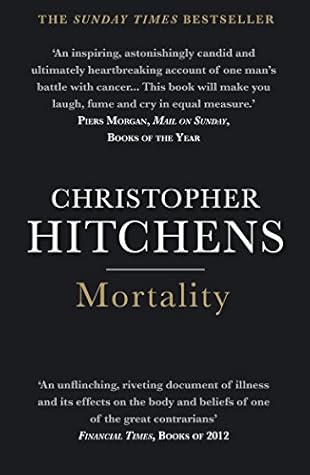More on this book
Community
Kindle Notes & Highlights
My father had died, and very swiftly, too, of cancer of the esophagus. He was seventy-nine. I am sixty-one. In whatever kind of a “race” life may be, I have very abruptly become a finalist.
In one way, I suppose, I have been “in denial” for some time, knowingly burning the candle at both ends and finding that it often gives a lovely light.
To the dumb question “Why me?” the cosmos barely bothers to return the reply: Why not?
Allow me to inform you, though, that when you sit in a room with a set of other finalists, and kindly people bring a huge transparent bag of poison and plug it into your arm, and you either read or don’t read a book while the venom sack gradually empties itself into your system, the image of the ardent soldier or revolutionary is the very last one that will occur to you.
If you maintain that god awards the appropriate cancers, you must also account for the numbers of infants who contract leukemia.
What if I pulled through and the pious faction contentedly claimed that their prayers had been answered? That would somehow be irritating.
Prayer: A petition that the laws of nature be suspended in favor of the petitioner; himself confessedly unworthy.
One way of trying to put them at their ease is to be as candid as possible and not to adopt any sort of euphemism or denial. The swiftest way of doing this is to note that the thing about Stage Four is that there is no such thing as Stage Five.
LIKE SO MANY OF LIFE’S VARIETIES OF EXPERIENCE, the novelty of a diagnosis of malignant cancer has a tendency to wear off. The thing begins to pall, even to become banal.
When you fall ill, people send you CDs. Very often, in my experience, these are by Leonard Cohen. So
So now every day I go to a waiting room, and watch the awful news from Japan on cable TV (often closed-captioned, just to torture myself) and wait impatiently for a high dose of protons to be fired into my body at two-thirds the speed of light.
In particular, I have slightly stopped issuing the announcement that “whatever doesn’t kill me makes me stronger.”
In the brute physical world, and the one encompassed by medicine, there are all too many things that could kill you, don’t kill you, and then leave you considerably weaker.
Certainly the book’s subtitle—“How to Philosophize with a Hammer”—has plenty of bravado.)
In the course of his essay, he used a potent phrase to describe the position of others who suffer like this, referring to them as lying on “mattress graves.”
To say the rash hurt would be pointless. The struggle is to convey the way that it hurt on the inside. I lay for days on end, trying in vain to postpone the moment when I would have to swallow. Every time I did swallow, a hellish tide of pain would flow up my throat, culminating in what felt like a mule kick in the small of my back.
This is the time of day when we in the Men’s Ward Think “One more surge of the pain and I give up the fight,” When he who struggles for breath can struggle less strongly: This is the time of day that is worse than night.
I’m not fighting or battling cancer—it’s fighting me.
Brave? Hah! Save it for a fight you can’t run away from.
Saul Bellow: Death is the dark backing that a mirror needs if we are able to see anything. Vertiginous feeling of being kicked forward in t...
This highlight has been truncated due to consecutive passage length restrictions.
You can get so habituated to bad news that good news is like Breytenbach and the cake. Consolations of saying, well at least now I won’t have to do THAT.
Onstage, my husband was an impossible act to follow. If you ever saw him at the podium, you may not share Richard Dawkins’s assessment that “he was the greatest orator of our time,” but you will know what I mean—or at least you won’t think, She would say that, she’s his wife.
My husband is an impossible act to follow. And yet, now I must follow him. I have been forced to have the last word.


